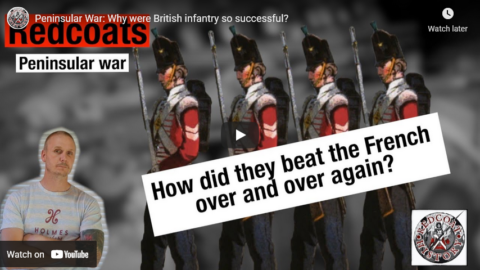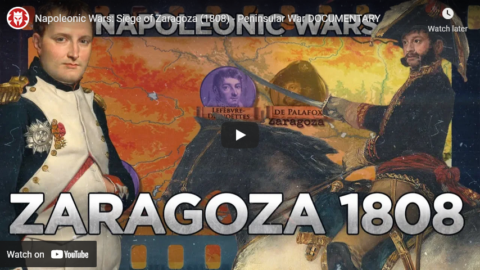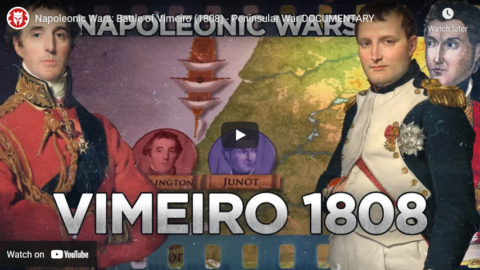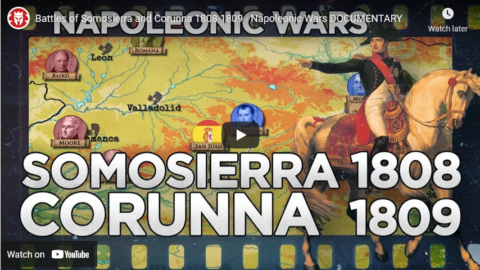Redcoat: British military history
Published 16 Dec 2021Why were the British redcoats so successful in the Peninsular war? There were many reasons, but amongst them was the way regiments were organised and the tactics they employed.
If you are interested in the Zulu War, then please sign up for my mailing list to receive my free book on the subject: www.redcoathistory.com
If you are very generous, you can also buy me a coffee and help support the channel via https://ko-fi.com/redcoathistory
January 4, 2022
Peninsular War: Why were British infantry so successful?
November 9, 2021
Napoleonic Wars: Siege of Zaragoza (1808) – Peninsular War
Kings and Generals
Published 30 Sep 2018
Our animated historical documentary series on the Napoleonic Wars are back with another episode covering the Peninsular War. The armies of Napoleon face more rebellions this time in Spain. And if the battle of Vimiero was crucial for the resistance in Portugal, the Siege of Zaragoza of 1808 played the similar role for the northern part of Spain. The battle of Bailen is just around the corner, and the Peninsular campaign will only get more interesting from here.This script was researched and written by Everett Rummage. Check out his brilliant Age of Napoleon podcast – http://bit.ly/2vC3cIE In our opinion, it is the best podcast on the Napoleonic era.
Support us on Patreon: http://www.patreon.com/KingsandGenerals or Paypal: http://paypal.me/kingsandgenerals
We are grateful to our patrons and sponsors, who made this video possible: https://drive.google.com/open?id=1KEV…
This video was narrated by Officially Devin (https://www.youtube.com/user/OfficiallyDevin)
Machinimas were made on NTW3 mod for Napoleon Total War by Malay Archer (https://www.youtube.com/user/Mathemed…)
✔ Merch store ► teespring.com/stores/kingsandgenerals
✔ Twitch ► https://www.twitch.tv/nurrrik_phoenix
✔ Twitter ► https://twitter.com/KingsGenerals
✔ Instagram ► http://www.instagram.com/Kings_GeneralsProduction Music courtesy of Epidemic Sound: http://www.epidemicsound.com
Napoleon Total War OST – “HMS Victory”
Napoleon Total War OST – “The Battle At Arcole”
Jon Björk – “Downfall 1”
Johannes Bornlöf – “Imperious 2”
Johannes Bornlöf – “Rise of the Phoenix 2”
Johannes Bornlöf – “Solemn”
Andreas Jamsheree – “Sunstorm 1”#Documentary #Kingsandgenerals #Napoleon
November 4, 2021
Napoleonic Wars: Battle of Vimeiro (1808) – Peninsular War
Kings and Generals
Published 12 Aug 2018Napoleonic Wars are back! It is 1807, and we find the Emperor of the French Napoleon Bonaparte at the height of his power, as he controls most of Europe after the War of the Fourth Coalition and the treaties of Tilsit. Napoleon decided to strangle his remaining enemy the United Kingdom economically by enacting Europe-wide Colonial Blockade, yet as Portugal defied him, he invaded it and then Spain. This was the beginning of the Peninsular War. Soon Spain and Portugal were in open rebellion. The first phase of the war ended when the British forces under Wellington landed in Portugal and fought the French General Junot at Vimeiro.
This script was researched and written by Everett Rummage. Check out his brilliant Age of Napoleon podcast – http://bit.ly/2vC3cIE In our opinion, it is the best podcast on the Napoleonic era.
Support us on Patreon: http://www.patreon.com/KingsandGenerals or Paypal: http://paypal.me/kingsandgenerals
We are grateful to our patrons and sponsors, who made this video possible: https://drive.google.com/open?id=1jjh…
This video was narrated by Officially Devin (https://www.youtube.com/user/OfficiallyDevin)
Machinimas were made on NTW3 mod for Napoleon Total War by Malay Archer (https://www.youtube.com/user/Mathemed…)
✔ Merch store ► teespring.com/stores/kingsandgenerals
✔ Twitch ► https://www.twitch.tv/nurrrik_phoenix
✔ Twitter ► https://twitter.com/KingsGenerals
✔ Instagram ► http://www.instagram.com/Kings_GeneralsProduction Music courtesy of Epidemic Sound: http://www.epidemicsound.com
#Documentary #Kingsandgenerals #Napoleon
March 27, 2021
Battles of Somosierra and Corunna 1808-1809 – Napoleonic Wars
Kings and Generals
Published 17 Feb 2019We are continuing our historical animated documentary series on the Napoleonic Wars with another episode on the Peninsular War, covering the battles of Somosierra and Corunna. Napoleon attempted to take back Madrid and crush the British resistance led by General Moore.
This script was researched and written by Everett Rummage. Check out his brilliant Age of Napoleon podcast – http://bit.ly/2vC3cIE In our opinion, it is the best podcast on the Napoleonic era.
Support us on Patreon: http://www.patreon.com/KingsandGenerals or Paypal: http://paypal.me/kingsandgenerals
We are grateful to our patrons and sponsors, who made this video possible: https://drive.google.com/open?id=1Jlq…
This video was narrated by Officially Devin (https://www.youtube.com/user/OfficiallyDevin)
Machinimas were made on NTW3 mod for Napoleon Total War by Malay Archer (https://www.youtube.com/user/Mathemed…)
✔ Merch store ► teespring.com/stores/kingsandgenerals
✔ Podcast ► Google Play: http://bit.ly/2QDF7y0 iTunes: https://apple.co/2QTuMNG
✔ Twitter ► https://twitter.com/KingsGenerals
✔ Instagram ► http://www.instagram.com/Kings_GeneralsProduction Music courtesy of Epidemic Sound: http://www.epidemicsound.com
#Documentary #Kingsandgenerals #Napoleon
August 27, 2018
Feature History – Peninsular War
Feature History
Published on 20 Aug 2017Hello and welcome to Feature History, featuring the Peninsular War and not much else. It’s not called Peninsular War and other stuff, just Peninsular War so really you can’t complain.
Help me defeat Napoleon (or not)
https://www.paypal.me/FeatureHistory
Patreon
https://www.patreon.com/FeatureHistory
https://twitter.com/Feature_History
Discord
https://discord.gg/Zbk4CvR
———————————————————————————————————–
I do the research, writing, narration, art, and animation. Yes, it is very lonely
February 6, 2017
QotD: General officer ranks in the Waterloo campaign
There were a lot of generals involved in the campaign in northern France and Flanders that began on June 14, 1815, and culminated in the memorable Battle of Waterloo on June 18th. Altogether there were 240 of them, to command nearly 360,000 troops. And since the troops came from a lot of different armies — British, French, Prussian, Netherlands, Hanover, Brunswick, and a few others, telling the generals apart can be a bit confusing.
[…]
Note that the rank structure is not really comparable to that prevailing today in the U.S. Army. The functional equivalent of a British major general or a French general de brigade or marechal de camp would actually be brigadier general based on their commands. The French rank system was actually much more complicated than may appear from the table. To begin with, the highest actual rank in the army was general de division. Marechal de l’Empire was technically a distinction, not a rank. Now it gets really complicated. A corps commander who was officially a general de division might by courtesy be designated a general de corps d’armee. However, a general de division might also sometimes be referred to as a lieutenant-general, particularly if he was functioning in a staff position. Meanwhile, the chief-of-staff of the army was designated major general. In addition, an officer commanding a brigade was more likely to be designated a marechal de camp (i.e., “field marshal”) rather than general de brigade, which was reserved for officers with special duties, such as the commanders of the regiments of the Garde Imperial. This complexity had developed as a result of the Revolution, which favored functional titles for military officers, chef de battailon for example, rather than major. Unfortunately, staff personnel often required rank, so the old Royal hierarchical titles of rank survived for a long time alongside the functional Revolutionary ones.
Further complicating matters was the fact that in all the armies an officer’s social rank was often used rather than his military rank. Thus, although Wellington was a Field Marshal he was usually referred to as “His Grace, the Duke” without his military rank. In Wellington’s case this could become quite complicated, as he was a duke thrice over, the Portuguese and Spanish having created him such even before the British, and he was also a Prince of the Netherlands. As each of these gave him a different title, references to him in Portuguese, Spanish, or Dutch works can easily become obscure. For example, to the Portuguese he was the Duque de Douro, and one Portuguese language history of the Peninsular War nowhere uses any other name for him. Then there is the problem of multiple ranks. Wellington, for example, was a field marshal in the British, Prussian, Netherlands, and Portuguese armies, as well as being a Capitan General in the Spanish Army. Although none of the other officers in the campaign had so many different ranks, several held more than one. For example, the Prince of Orange was a Dutch field marshal and a general in the British Army, while the Duke of Brunswick, who commanded his division in his capacity as duke, was also a lieutenant-general in the British Army.
Al Nofi, “Al Nofi’s CIC”, Strategy Page, 2000-02-01.
May 27, 2015
Sir Arthur Wellesley, before the fame and fortune
At The Diplomat, Francis P. Sempa looks at the early commands of Sir Arthur Wellesley (later the Duke of Wellington) as formative experiences:
Before Waterloo, Wellington had brilliantly commanded armies on the Iberian Peninsula, where they wore down and drained French forces, causing Napoleon to refer to it as “the Spanish ulcer.” But Wellington learned how to command, supply, and lead soldiers to victory not in Europe, where he is most remembered, but in India. Wellington in India, wrote biographer Elizabeth Longford, was “a great commander in embryo.”
Wellington, then Colonel Arthur Wesley (the last name was later changed to Wellesley) of the 33rd regiment, arrived in Calcutta at the age of 28 in February 1797, after a journey of more than three months. His most recent biographer, Rory Muir, described Colonel Wesley as “an unusually ambitious, intelligent and well-read officer who looked far beyond the horizons of his regiment … and who was already comfortable assembling his thoughts into coherent arguments …” In all, he spent eight years in India, where for much of the time his brother was Governor-General. Wellington’s time in India, writes Muir, “were crucial years in which he developed his skills as a commander of men, a tactician, a strategic planner and a civil governor.” It was in India that the future victor of Waterloo and future prime minister of Great Britain first dealt with questions of war and peace and civil government.
On March 26, 1799, troops under Wellington’s command came under attack by forces of Muslim ruler Tipu Sultan, the Tiger of Mysore. As the French-trained enemy forces approached, wrote Elizabeth Longford, Wellington’s men held their fire “with the utmost steadiness until the enemy were sixty yards away.” British infantry then decimated the columns of enemy attackers, spreading confusion, while cavalry forces scattered the remnants of the attacking force. Then, during April and May 1799, Wellington participated in the siege of Seringapatam in Mysore, and led an attack on the entrenchments of the fortress there. After Seringapatam was taken, Wellington was made civil governor and remained there until 1802.
During his time in Seringapatam, Wellington was ordered to suppress a rebellion in north Mysore led by Dhoondiah Waugh. For the first time, Wellington exercised independent command in battle. During this operation, Rory Muir explains, Wellington “displayed all the characteristics of his subsequent campaigns, …” which included attention to logistics and “unremitting aggression.” He fought a battle at Conaghul and won a complete victory. Muir writes that Wellington exhibited a remarkable flexibility on the field of battle. A British officer commented on Wellington’s “alacrity and determination” during battle.
August 18, 2013
QotD: The unluckiest regiment in the British army
The history of the 24th Regiment (later the South Wales Borderers) is certainly one of the most interesting stories of any regiment in the British army. Throughout its long history, going back to 1689, it had been an exceptionally courageous regiment and also exceptionally unlucky. In 1694 it had taken part in the ill-fated descent on Brest. In the War of Jenkins’s Ear and the attack on Cartagena it lost more than half its number from disease in the West Indies. In 1756 it was forced to surrender to the French at Minorca. The entire regiment was captured in the American War. Forty-six per cent of the second battalion were casualties at the Battle of Talavera in the Peninsula War — more than any other British regiment engaged. In 1810 about 400 men, nearly half the regiment, were captured by the French while on troopships from South Africa bound for India.
Perhaps it is as well to outline here the story of this gallant but ill-starred regiment after the Battle of Chilianwala. The catastrophe which overtook it in the Zulu War will be described later. In World War I it was in the disastrous Gallipoli campaign, and on 3 December 1917 the second battalion marched out of the lines in France with only two officers, the doctor and seventy-three men. In World War II a battalion was captured by the Germans near Tobruk and, naturally, it was part of the unfortunate expedition to Norway in 1940 — even the ship carrying them struck a rock and sank.
Byron Farwell, Queen Victoria’s Little Wars, 1972







